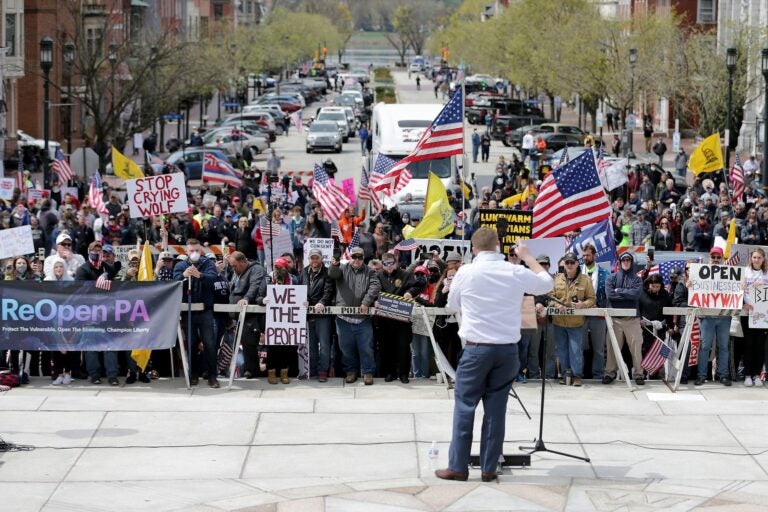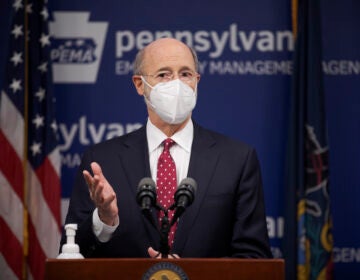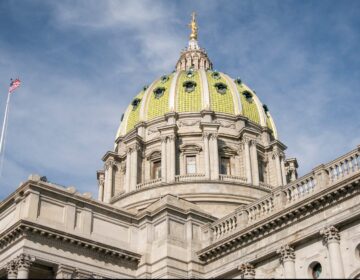Some GOP lawmakers are prepping a nuclear option to revoke Wolf’s emergency powers. But it probably won’t work.
A group of Republican lawmakers might fire up Pennsylvanians who want to see the state reopen, but the nuclear option is practically impossible to pull off.

On Monday, four Republicans spoke on the steps of the Capitol to an angry crowd of hundreds of people protesting Gov. Tom Wolf’s stay-at-home order. (David Maialetti/Philadelphia Inquirer)
This story was produced as part of a joint effort among Spotlight PA, LNP Media Group, PennLive, PA Post, and WITF to cover how Pennsylvania state government is responding to the coronavirus. Sign up for Spotlight PA’s newsletter.
A small contingent of Pennsylvania Republicans have prepared a nuclear option to revoke Gov. Tom Wolf’s emergency powers, as lawmakers continue to pressure the Democratic governor to reverse the sweeping actions he’s taken to slow the spread of the coronavirus.
But while that option might fire up those who want to see the state reopen, it’s practically impossible to pull off.
In an unusual plot twist, the normally powerful GOP-led state legislature has been largely sidelined during the coronavirus outbreak, while Wolf has used his new-found power to close businesses and impose restrictions on the lives of 12.8 million people.
Those steps have closely tracked with the recommendations of nearly all state and federal health officials, and those same officials have cautioned against a hurried reopening. On Monday, however, four Republicans spoke on the steps of the Capitol to an angry crowd of hundreds of people protesting Wolf’s measures.
“Never before in the history of this commonwealth has a governor exercised so much power,” Sen. Doug Mastriano (R., Franklin) said. “It’s time to roll that back.”
The Republican majority in the legislature has already passed legislation to begin to undo the closures, only to be met by Wolf’s veto pen. Now, despite the warnings from health officials and polls indicating wide support for the stay-at-home orders, some Republicans want to go further.
Mastriano in the Senate and Rep. Russ Diamond (R., Lebanon) in the House have introduced resolutions that would force Wolf to end his emergency declaration.
Diamond said it was important to have the resolution “ready just in case.”
“I think that we’re trying to do our due diligence to work with the governor,” he said. “But in the end, the same law that authorizes the governor authorizes us to terminate it at any time.”
There’s just one problem: The legislature needs Wolf’s approval to do it.
When Wolf signed a disaster declaration March 6 in response to the growing coronavirus threat, he triggered a decades-old law that has been used in the past for hurricane and snowstorm response.
The 1978 statute gives the legislature the power to require the governor to end his emergency declaration at any time through a concurrent resolution, which the GOP majorities could pass without any Democrats on board.
But under the state Constitution, the governor is allowed to reject this kind of proposal. Republicans would need at least some Democrats to join the cause to gather the two-thirds majority needed to override Wolf’s inevitable veto — a near-impossible scenario.
When Spotlight PA reached out to Diamond about Wolf’s power to block the resolution, he replied, “The governor can pretty much do what he wants.”
A spokesperson for Wolf forwarded a request for comment to the Pennsylvania Emergency Management Agency, which provided details on how the state’s emergency declaration is tied to the availability of federal dollars.
While under Wolf’s emergency declaration, the General Assembly has passed a bill that would reopen businesses and advanced one that would create an intergovernmental task force and give individual counties the power to reopen their own economies, in effect redistributing the power away from Wolf. The governor has vetoed one of the measures and vowed to block the other, citing the harm opening businesses in this manner could have on public health.
With their powers diminished, Republican lawmakers are turning to one area where they still have some muscle: hearings.
Two state Senate committees will hold a hearing Thursday to gather more information about the state’s response to the coronavirus. Secretary of Health Rachel Levine, as well as the heads of PEMA and the Department of Community and Economic Development, have agreed to testify, according to a spokesperson for Sen. Tom Killion (R., Chester).
The Department of Community and Economic Development will likely be of particular interest to lawmakers, since it was tasked by Wolf with approving or denying waivers to allow businesses to reopen. Those decisions were made in secret and have been criticized as inconsistent and unfair.
Some lawmakers say their frustrations stem from the lack of transparency in the waiver process, in part because of claims that it has allowed big-box stores to remain open while forcing small businesses to close.
“We do absolutely respect the challenge the governor has had to address,” said Mike Straub, a spokesperson for House Majority Leader Bryan Cutler (R., Lancaster). “We don’t take issue with the fact that he’s had to make decisions very, very quickly outside the legislative process. But as much as possible we’d like to be engaged in the recovery plan.”
In an April 15 letter, Mastriano told Wolf he intends to subpoena the administration for documentation on “why you approved businesses for a waiver, and which ones you shut down.”
“It is the constitutional responsibility of the General Assembly to provide oversight of the Executive Branches and its actions, especially during this emergency crisis,” he said.
Members are also frustrated with Wolf’s lack of communication before he made sweeping orders, with leaders sometimes finding out what action he’s taken through press releases, Straub added. On top of hearings, members have sent letters to the governor, urging him to take action and reopen sectors of the economy that they believe can be safely done using Centers for Disease Control and Prevention guidelines.
Wolf told reporters Tuesday that he talks with Republican leaders “all the time” and is trying to work with them on coronavirus response. Earlier this week, he announced plans to ease restrictions on construction and car sales, two sectors that Republican lawmakers had been advocating for.
 100% ESSENTIAL: Spotlight PA relies on funding from foundations and readers like you who are committed to accountability journalism that gets results. If you value this reporting, please give a gift today at spotlightpa.org/donate.
100% ESSENTIAL: Spotlight PA relies on funding from foundations and readers like you who are committed to accountability journalism that gets results. If you value this reporting, please give a gift today at spotlightpa.org/donate.
WHYY is your source for fact-based, in-depth journalism and information. As a nonprofit organization, we rely on financial support from readers like you. Please give today.


![CoronavirusPandemic_1024x512[1]](https://whyy.org/wp-content/uploads/2020/03/CoronavirusPandemic_1024x5121-300x150.jpg)


